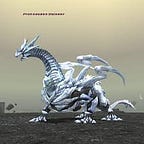NFTs are the new hot topic in the crypto world but what the hell are they and why does it matter? This is a question I have asked myself several times. I got one NFT when I got my STX wallet through the stacks network as part of a drop and this is what got my interest in the ecosystem. You see people buying parts of a tweet, a random picture, people talking about it being a solution for Intellectual Property concerns but questions arise on how do you know they are real, what gives them value, what powers the ecosystem, what stops them from being hacked, can they be used for smart contracts or yield creation, etc? I don’t know all the answers to these questions and am still new to the NFT space only have a free one the came with a wallet but would like to share what I have learned so far and some potential gaps I see in the NFT ecosystem that if a solution can be built into the ecosystem structure it could be game-changing to bring trust to the ecosystem.
NFTs are simply a way to digitally represent anything on the blockchain. They consist of tokens that represent things like art, collectibles, real estate, intellectual property, and even tweets or social media posts. It makes you wonder how much would things like @realdonaldtrump’s Confeve tweet go for, or could you create NFT from the first MySpace post if you want nostalgia. This is great to create a new market place but what are the flaws in the space and what should one consider when buying an NFT other than baseline cost.
For anyone that works in IP, art, real estate, etc. you know these industries have multiple cases of fraud, abuse, duplication, faking of items, etc. does the blockchain really solve these by digitizing them with a simple timestamp, or is there coding in each item to ensure it is truly non-fungible. If something is created on one chain is it any different than it being duplicated on another chain? How do buyers know which one is the original? Is verification easily done? Would if the original creator is not available to discuss it with or ensure it is real if there are multiple instances created around the same date of a similar NFT. In the non-digital world, we call this provenance and it is usually provided with a purchase to be verified by an expert and a level of insurance is provided to guarantee its authenticity. There are already examples of some of the topics in the NFT ecosystems such as Cyberpunks duplicated from ETH to BSB by scammers https://www.reddit.com/r/CryptoCurrency/comments/lr3jbo/binance_has_stolen_cryptopunks_artworks_which/. Some other example can be found in this article https://nftplazas.com/7-nft-scams/.
With these concerns, it begs the question will there eventually be an insurance and verification marketplace and tokens to handle this. I believe this is something the ecosystem needs badly to reach its full potential as there is fear preventing many from jumping on board. the concept of PAID network for smart contracts which is a relatively new and evolving project provides a way to create a decentralized policy structure for smart contracts and adjudication for payment disputes through a council guarantying fair and efficient execution of smart contracts.
The structure is already there to make the process more efficient. You could gather provenance data using Graph Protocol(GRT), Control the data release through NuCypher (NU) use Chainlink (LINK) to bring on-chain verified with the data. An insurance network built with multichain linkage could solve the fear problem that exists in NFTs currently and could be a big move for the ecosystem. It could work something like a prove token for example (Prove token doesn’t exist) would be staked at the point of offer to allow for access to verification data. The offeror would provide verification date to the chain being use for transfer using LINK (on-chain verification) and FIL (data storage of provenance). After that, they would stake this data with an amount of prove tokens to show the level of provenance. When a buyer was ready to purchase or offer a bid they could access the provenance for a fee to pay the utility structure providers to provide the verification data and be offered protection on authentication of the NFT asset similar to the concept of title insurance in physical real estate. This is just a concept on some thoughts I’ve had on the growing NFT craze and I would love to learn more especially if something like this might already exist.
This article is an opinion piece and is not financial advice and should not be considered as such.
